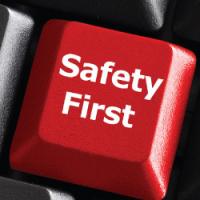- Posts: 350
- Thank you received: 11
Machine Guards
- Safety Toolbox Talk Webmaster
-
 Topic Author
Topic Author - Offline
- Administrator
-

We've all had the experience of doing what we thought was a favor for someone, only to have it rejected or unappreciated. I suppose if machine guards were human they would experience this type of frustration frequently. While the basic motive for guarding is to protect, not prohibit, guards are often looked upon by employees as obstacles. However, guards wherever they are and whatever they are . . . are placed for protection.
Specifically, machine guards are used to protect against direct contact with moving parts. There are also guards designed to protect against flying chips, kickbacks and splashing of metal or harmful liquids.
Another area involves guards against human failures. You can understand why this demands a lot from any type of guard, in as much as the scope of human failure is much broader than the protection of a guarding device.
However, guards are engineered to give as much protection as possible, even to machine operators who deliberately take chances or who are distracted or emotionally upset on the job.
While guards may often appear to be a hindrance, overall they have proven to be otherwise. They've made large contributions to both security and production. Greater machine speeds have been made possible through proper guarding and certainly the conscientious employee works with greater confidence knowing that a machine offers maximum protection.
Two types of guards are used to protect machine operators and probably most of you have been involved with one or the other. These are fixed guards and interlocking and gate guards. Fixed guards are most commonly used and are preferred over others, the obvious reason being that the fixed guards protect you from dangerous parts of machines at all times. Fixed guards may only be adjusted by authorized persons.
Interlocking guards are used if a fixed guard is not practical. This type will not allow the machine to operate until dangerous parts are guarded. The interlocking guard is designed to disconnect the source of power from the machine. Safety devices such as pullbacks, sweeps and electronic devices are used where neither a fixed nor interlocking guard can be used satisfactorily.
Safety devices are operated by the machine itself. When this type of guard is used on a machine that is loaded and unloaded by hand, the operator must use hand tools.
As I pointed out earlier, no guard can do the job without the cooperation of the person operating the machine. When a new employee starts work, we attempt to explain the job thoroughly. This indoctrination includes calling attention to guarding devices. After that, if there are any questions concerning guards or any other part of the job, the answers should be sought from the supervisor. But again it should be noted that the employee's attitude toward safety is important.
It is important that everyone working with or around machinery understands the generally accepted safe procedures for this type of work. No guard shall be adjusted or removed unless permission is given by the supervisor, or the employee concerned is specifically trained and the adjustment is considered a normal part of the job.
In addition, no machine should be started without guards in place. If you see that guards are missing or defective, report it to your supervisor immediately. When guards or safety devices are removed for repair or adjustment, the power for the machine should be turned off and the main switch locked and tagged.
A final point concerns safe dress. Loose clothing, neckties, watches, rings or other jewelry should not be worn around mechanical equipment. In fact, as most of you already know, these items of apparel are considered dangerous on many jobs.
Everyone wants to work in safety. To do this, you must have a mature respect for machinery and for safeguards. They both will do this job for you if you let them.
Please Log in or Create an account to join the conversation.
